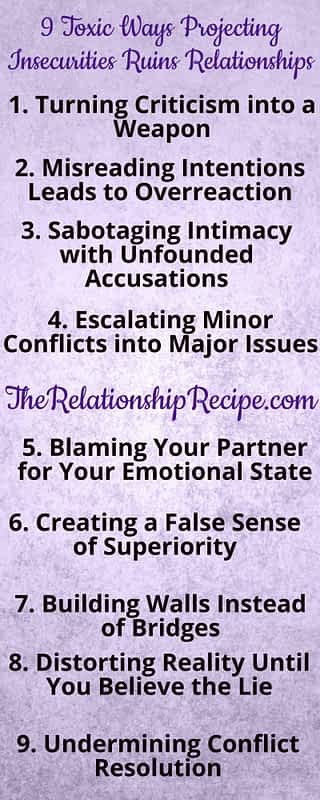Projecting Insecurities in Relationships: 9 Toxic Ways It Wreaks Havoc
Projecting insecurities in relationships is the fastest way to screw things up without even realizing you’re doing it. It’s like planting a ticking time bomb right in the middle of your relationship, and then acting surprised when it blows everything up.
It usually starts small: you get weird about their texts, or you assume they’re annoyed when they’re just tired. But it adds up fast.
Instead of dealing with your own doubts, you toss them at your partner and expect them to sort it out. That’s not love – that’s emotional hot potato. And let’s be honest, it’s one of the biggest signs of projecting insecurity.
If you’ve ever spiraled over a harmless comment or picked a fight for no reason, you’ve already dipped your toes into self-sabotage in love. And if you’re on the receiving end, dealing with an insecure partner can be straight-up exhausting.
💡Key Highlights
- Why projecting insecurities in relationships quietly wrecks relationships
- How tiny doubts spiral into massive conflicts you didn’t see coming
- The sneaky ways insecurity ruins your relationship without you realizing
- What self-sabotage in love looks like when you least expect it
- How to spot the signs of projecting insecurity, and finally stop doing it

Projecting Insecurity and My Own Self-Sabotage in Love
I’ll be the first to admit that projecting insecurities in relationships has been one of my biggest struggles. In my marriage, I tend to think I’ve got all our issues “figured out” before they even exist. It’s like I can’t help trying to predict every possible problem, just so I feel safe.
Part of me believes that if I look far enough ahead, I can avoid getting hurt. So I keep a backup plan just in case Plan A falls apart. I’ve honestly been like this my whole life, because my ADHD brain craves clarity – even on things that haven’t happened yet, and may never happen. I never want to get caught with my proverbial pants down, if you know what I mean. I’m always trying to be prepared for whatever might come my way.
But here’s the reality: most of the fears I’m projecting onto my partner rarely actually happen. Even so, I catch myself assuming how he’ll react or what he’ll say, because we’ve known each other so long. Those habits are hard to break.
Looking back, the times I’ve let these thoughts take over, without pausing to question them, have been some of the biggest examples of self-sabotage in love. Acting on those assumptions almost never serves me, him, or our relationship.
I know this is one of the clearest signs of projecting insecurity, and I’ve seen firsthand how much insecurity ruins relationships when it’s left unchecked. Dealing with an insecure partner isn’t easy, and I don’t want to keep bringing that baggage into our marriage.

Why Projecting Insecurities in Relationships Happen
Projecting insecurities in relationships usually happens because it feels easier than facing your own stuff head-on. Admitting you feel inadequate, scared, or ashamed can feel like ripping your chest open. So instead, you hand those feelings over to your partner and hope they’ll carry them for you.
It’s a defense mechanism that’s supposed to protect you from feeling exposed. But all it really does is pile on more issues. Before you know it, you’re seeing all the signs of projecting insecurity in the form of constant arguments, overthinking, and that creeping sense you can’t trust each other.
This is exactly how insecurity ruins relationships and turns something good into a mess of resentment and confusion. And if you don’t get honest about it, you’re stuck in a cycle of self-sabotage in love. Plus, dealing with an insecure partner can wear anyone down. No one wants to feel like they’re always walking on eggshells.

Signs of Projecting Insecurity You Might Recognize
Let’s break down a few classic ways projecting insecurities in relationships shows up, because if you’re like most of us, you’ve probably done at least one of these without realizing it.
🚩Insecurity about attractiveness
You’re convinced you’re not desirable enough, so you start accusing your partner of losing interest. Maybe you nitpick their tone or obsess over every little thing they do or don’t do. You might say, “You don’t even look at me the way you used to,” when really, you’re the one who feels disconnected from yourself. It’s a textbook example of self-sabotage in love, and it usually pushes your partner further away instead of getting the reassurance you crave.
🚩Fear of failure
If you struggle with feeling inadequate, you might turn that insecurity into criticism. Suddenly, your partner’s ambitions feel like a personal threat, and you find yourself downplaying their successes or pointing out every possible flaw in their plans. You tell yourself you’re just being “realistic,” but honestly, you’re projecting your fear of not measuring up. Over time, that negativity chips away at respect and insecurity ruins relationships faster than you can say, “I’m just trying to help.”
🚩Fear of rejection
This one’s a classic: you’re terrified they’ll leave you, so you accuse them of not being committed enough. You might question their loyalty, demand constant reassurance, or test them to see if they’ll prove you wrong. Meanwhile, you’re too scared to admit you’re the one who feels like you’re not worth sticking around for. If you’ve ever wondered why you end up in the same fight over and over, it’s because this is one of the biggest signs of projecting insecurity.
💡The bottom line is it can be fear of not being attractive, successful, or lovable enough, these patterns only drain the life out of your relationship and make everything feel tense. Dealing with an insecure partner (or being one yourself) gets exhausting fast.

How Insecurity Ruins Relationships From the Inside Out
The emotional toll of projecting insecurities in relationships is no joke. Over time, it eats away at trust, builds walls of resentment, and sets up a toxic dynamic where nobody feels heard or understood.
If you’re the partner on the receiving end, it can feel like you’re constantly walking on thin ice. You never know what harmless comment is going to trigger an accusation or a meltdown. It’s emotionally exhausting trying to prove your good intentions when every little thing gets twisted into evidence you don’t care.
And if you’re the one doing the projecting, you’re not exactly winning either. You end up feeling even more isolated, stuck in your own head, and convinced your worst fears are true. It’s a lonely place to be—like you’re trapped inside this loop of doubt and self-criticism you can’t escape.
This is how insecurity ruins relationships piece by piece. The longer it goes unchecked, the harder it becomes to remember what healthy connection even felt like. Before you know it, both of you are just trying to survive instead of actually enjoying each other.

9 Unexpected Ways Projecting Insecurities in Relationships Happen
Here’s a closer look at how projecting insecurities in relationships destroys even the best relationships in sneaky, unexpected ways.
🚩1. Turning Criticism into a Weapon
One of the biggest signs of projecting insecurity is how fast it turns your personal doubts into attacks on your partner. Instead of owning up to the fact that you feel inadequate or insecure, you go on the offensive. You accuse them of the very things you can’t stand in yourself.
This move might give you a quick hit of relief, like, whew, at least it’s their problem, not mine, but it’s a classic case of self-sabotage in love. You’re not actually solving anything. You’re just shifting blame and avoiding your own stuff.

🚩2. Misreading Intentions Leads to Overreaction
When you’re projecting insecurities in your relationship, it’s almost guaranteed you’re going to misread your partner’s intentions. You can’t help it—your brain is wired to protect you from the stuff you’re most afraid of, even if that means distorting reality.
For example, if you’ve got a deep fear of abandonment, every little thing starts to feel like proof they’re about to walk out the door. Your partner has a busy week at work? Suddenly, you’re convinced they don’t care anymore. They forget to text back for a couple of hours? Clearly, that means they’re done with you.
Before you know it, you’re stuck in endless arguments about things your partner doesn’t even understand. They feel blindsided, you feel justified, and everyone’s exhausted.

🚩3. Sabotaging Intimacy with Unfounded Accusations
Nothing cranks up the drama in a relationship quite like dealing with an insecure partner, and when your own self-worth is on shaky ground, it’s way too easy to slip into suspicion and jealousy over… nothing.
If you secretly feel unworthy of love, your brain goes into overdrive trying to protect you from rejection. So instead of admitting you’re scared, you accuse your partner of messing around, lying, or hiding things, even when there’s zero evidence. It’s like your fear needs something to latch onto, so it invents a reason to panic.
You’re convinced you’re just being “honest about your feelings,” but really, it’s pure self-sabotage for your relationship.
Over time, this pattern creates a toxic environment where nobody feels safe to be open. Your partner ends up feeling like they’re always on trial, tiptoeing around to avoid setting off another round of questioning. Insecurity ruins relationships faster than almost anything else when it turns everyday moments into interrogations.

🚩4. Escalating Minor Conflicts into Major Issues
When you’re deep in the habit of projecting insecurities in your relationship, even the tiniest disagreement can morph into a five-alarm meltdown.
You start out talking about something small, like whose turn it is to do the dishes, and somehow end up in a screaming match about how “selfish” or “inconsiderate” your partner is. Everyone knows it’s not really about the dishes.
This happens because your insecurities are working overtime to twist every conflict into proof that you’re unappreciated or unloved. Instead of seeing the situation for what it is (a minor annoyance), you interpret it as a sign your partner doesn’t care. That’s classic self-sabotage in relationships, and it’s one of the biggest signs of projecting insecurity out there.
This emotionally reactive blame game becomes a toxic cycle. What could have been fixed with a little clear communication turns into a pattern of resentment and defensiveness. Before long, you’re both stuck in the same exhausting loop with one person overreacting, the other constantly in a state of emotional whiplash.

🚩5. Blaming Your Partner for Your Emotional State
One of the sneakiest ways projecting insecurities messes everything up is by offloading your emotional baggage onto your partner. You might catch yourself saying things like, “You make me feel so anxious,” or “You’re the reason I can’t relax,” as if they’re personally in charge of regulating your entire nervous system.
Your anxiety usually isn’t coming from their actions – it’s coming from your own unresolved fears. Maybe you don’t feel worthy of love. Maybe you’re terrified of rejection. Whatever it is, it’s not their job to fix it for you.
This kind of blame-shifting is one of the classic signs of projecting insecurity. It feels easier to say “You’re making me feel this way” than to own your part of the story. But over time, it creates a toxic dynamic where your partner feels like they’re constantly failing some invisible emotional test.
Eventually, this pressure breeds codependency. You end up relying on your partner to soothe every insecurity and calm every fear, while they slowly burn out handling all the emotional labor in the relationship.

🚩6. Creating a False Sense of Superiority
Sometimes, insecurity struts in wearing a big, smug grin and acting like it owns the place. If you feel insecure about your intelligence, success, or worth, you might overcompensate by puffing yourself up and tearing your partner down. You slip into little digs, snide comments, or flat-out belittling them because if you make them feel small, you get to feel a little bigger.
It’s a classic example of relationship self-sabotage: your insecurities quietly whisper “You’re not good enough,” so you try to outrun that feeling by acting superior. It might give you a temporary ego boost but it’s basically “emotional junk food.” It doesn’t last, and it leaves everyone feeling sick.
This behavior also creates a nasty power imbalance that slowly poisons trust and intimacy.

🚩7. Building Walls Instead of Bridges
When you’re busy projecting your insecurities in your relationship, you’re basically putting up emotional fences instead of opening doors. Instead of owning your fears or talking about what’s really bugging you, you dump those feelings onto your partner and then wonder why things feel cold and distant.
Instead of saying, “Hey, I’m scared you might leave,” you’re busy accusing your partner of being distant or uncaring. The problem is, neither of you gets to the heart of what’s really going on. You end up stuck in surface-level interactions that never go anywhere meaningful.

🚩8. Distorting Reality Until You Believe the Lie
One of the cruelest tricks of projecting insecurities is that eventually, you start buying into your own drama. Say you’re scared you’re unlovable – you might project that fear onto your partner so much that you actually start believing they don’t love you. Even when everything they do screams the opposite.
It’s emotional gaslighting… but you’re the one doing it to yourself. Your insecurities twist your reality until you can’t trust the love right in front of you.
This kind of self-sabotage isn’t just painful – it’s exhausting for both of you. That’s how insecurity ruins relationships slowly, and under the weight of fears that have zero basis in reality.

🚩9. Undermining Conflict Resolution
When you’re projecting insecurities, healthy conflict resolution flies right out the window. Instead of talking about what’s really bothering you, you end up launching attacks that make your partner feel like they’re under siege.
Say you’re feeling anxious about the future. Instead of saying, “I’m worried about where we’re headed,” you might say, “You never care about what I want.” See the difference? One opens the door to a real conversation; the other slams it shut with blame.
This is one of the clearest signs of projecting insecurity by turning manageable problems into personal battles. Suddenly, you’re not solving anything. You’re just defending bruised egos and dodging emotional landmines. You both get stuck fighting ghosts instead of facing the real issues.

Strategies to Avoid Self-Sabotage in Love
The best advice I’ve come across for helping relationship issues is to “observe things like a camera capturing a scene.” Only talk about what you can actually see, without adding extra interpretations.

Once you adopt this mindset, you’ll quickly notice when your adding more layers than necessary to the observations in your relationship. Here are some other ways to avoid either avoid projecting insecurities you have, or someone else doing it to you.
✔️Self-awareness: Reflect on your insecurities and how they might be influencing your behavior.
✔️Open communication: Share your vulnerabilities with your partner instead of masking them with accusations or criticism.
✔️Therapy: Work with a therapist to address deep-rooted insecurities that fuel projection.
✔️Pause before reacting: When you feel triggered, take a moment to ask yourself whether the issue lies within you or your partner.
✔️Practice empathy: Put yourself in your partner’s shoes and try to understand their perspective before jumping to conclusions.

Final Thoughts on How Insecurity Ruins Relationships
Projecting insecurities in any relationship is toxic. It’s like dumping emotional garbage all over something that could actually be pretty great. But the good news is it doesn’t have to be the story of your love life forever.
When you learn to spot the signs of projecting insecurity, you can finally stop blaming your partner for feelings or issues they didn’t create. Instead of spiraling into relationship self-sabotage, you get the chance to own your stuff and talk about it honestly. That’s when real connection happens – the kind where you both feel seen, heard, and actually understood.
Thank you for reading this post, don't forget to subscribe!







